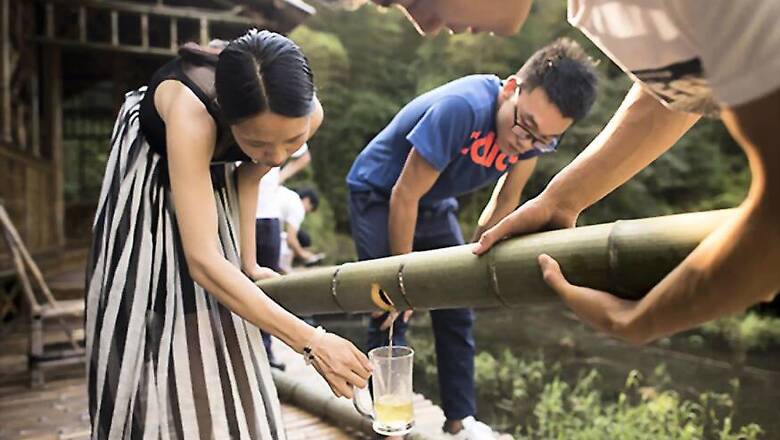
views
A manufacturer of Chinese liqueurs, Chen Chao wanders through the bamboo-covered mountains of southwestern China's Sichuan province to his 'cellar', where he will check on this year's prize blend.
In the absence of an oak barrel, the 30-year-old uses live bamboo trunks to age his spirit, a method reputed to confer a unique aroma and even medicinal benefits.
The cereal liqueur is introduced into bamboo trunks "via high-pressure injection techniques", he said.
Young bamboos are preferred, he said, because they "heal" within days, allowing the spirit to mature before the trunk is finally cut in early April, in time for the annual Qingming, or tomb-sweeping, festival when many Chinese honour their ancestors.
During the ageing process, "the liqueur mingles with the flavone (the liquid released by the trunk) and the sap of bamboo", Chen said, referring to two ingredients renowned for their "detoxifying" effect and contribution towards healthy lungs, according to traditional Chinese medicine.
This method also reduces the alcohol content of the beverage, since the bamboo absorbs it.
"Our production is fairly limited, roughly 50,000 to 60,000 bottles per year, each containing between 500 and 550 millilitres," Chen said, with a total annual output of at least 25,000 litres.
But he now hopes to increase that amount by using a "less invasive" and more efficient injection technique, in a bid to fend off competition.
"Previously, few people knew about bamboo alcohol, because the production was kept confidential. This is changing," he said.
Chen learned the traditional technique in the eastern province of Fujian -- where it originated.
He then launched his own brewing business in 2015 in Sichuan, in the heart of the famous Shunan Bamboo Sea, a vast forest known for the production of Wuliangye, a white spirit made with sorghum, sticky rice, maize, and wheat.
But his business has suffered since China launched a much-publicised anti-corruption campaign after President Xi Jinping came to power in 2012.
The anti-graft drive has included a ban on giving extravagant gifts like expensive wines and spirits to public officials and "sent our business plunging", Chen said.
During the last Tuen Ng, or Dragon Boat, Festival in 2016, his sales collapsed by two thirds compared to the previous year.
But recovery may be in sight. Wuliangye -- the brand behind the eponymous spirit -- has reported an 18 percent increase in its turnover and net income during the first half of 2016.




















Comments
0 comment